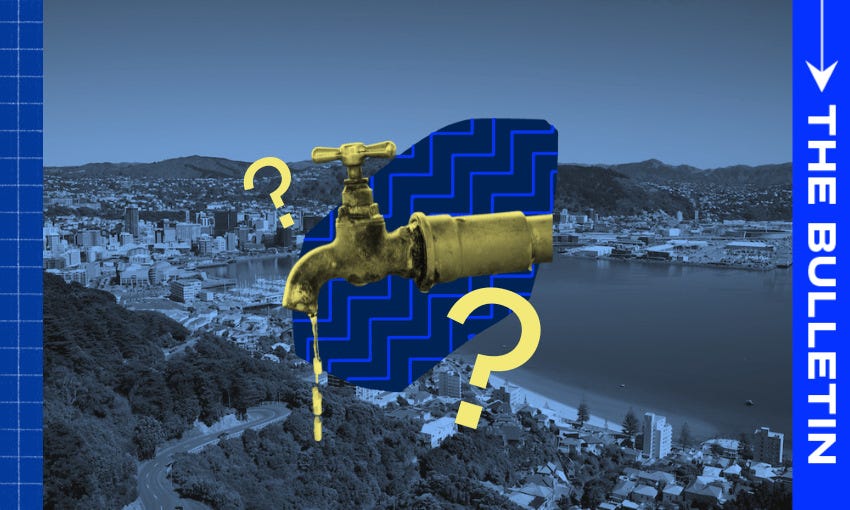The new way New Zealanders will get their water
Joining forces on water services will be 'optional' for councils – but the government's retaining the right to make them partner up.
Mōrena, and welcome to The Bulletin for Friday, August 9.
In today’s edition: Influential RBNZ survey suggests inflation has been tamed; teachers say maths requirement will deter good candidates; Aratere ferry damaged again. But first, the government says its water reforms will allow much-needed investment by councils – but Labour says ratepayers could be left on the hook.
Forced amalgamation on the table
Councils could be forced to amalgamate their water services under new legislation previewed by ministers Simeon Brown and Andrew Bayly on Thursday. The initial outline of the government’s plan for a Three Waters replacement was first revealed in February, and now the details have been filled in. As already established, neighbouring councils will be able to join forces to create a multi-council-owned water service provider, or go it alone if they wish. However, as Thomas Manch notes in The Post, “there has been concern that some councils might be left in the cold, as larger neighbours decide against combining water services with them”. Brown says the legislation will include a “backstop” to allow forced amalgamation, but has refused to say what might cause the government to step in. Once the law passes in the coming weeks, councils will have 12 months to finalise their plans.
The government is also tweaking some water quality standards which it says have hampered the ability of the Water Services Authority, Taumata Arowai, to do its job.
Controversy over CCO budgets continues
Three Waters stipulated “balance sheet separation”, which would have divided the accounts of the new council-controlled organisations (CCOs) from those of the councils themselves. Under National’s plan, however, councils will own the water entities and fund debt through “ringfenced” revenue – “most likely from charges obtained for water usage, measured by water meters, but this will be determined by councils”, explains Manch. The debt required to fund desperately needed new infrastructure will be supplied at below-market rates by the Local Government Funding Agency, reports RNZ. The new water entities will be able to borrow five times their revenue – much more than other CCOs – subject to "prudent credit criteria".
Brown says the new funding plan will allow the water entities to source the funding they need "while minimising costs on ratepayers". However Labour local government spokesperson Kieran McAnulty says the government’s plan doesn’t stack up. "There's a clear reason why this wasn't pursued [under Labour]. It's because the credit rating agencies made it very clear that unless there was balance sheet separation, the savings that are required wouldn't be found.” With councils ultimately responsible for the debt, the result would be “ongoing rates increases” for householders, he says.
Wellington Water chief executive out
After months of damaging news stories about her leadership, Wellington Water CEO Tonia Haskell has announced her resignation. In May it was revealed that the agency had made a $51 million dollar mistake in its budget, forcing the five Wellington councils to find up to $20 million extra in their long-term plans. In late July, an independent review of the circumstances that led to the error was scathing about the agency’s performance, finding “a lack of strategic leadership at the highest levels of the organisation, and wider problems of organisational culture”. Wellington Water board chair Nick Leggett said uncertainty over the government’s water plans could have contributed to the problems. “The anticipation of imminent water reforms may have made Wellington Water too timid in addressing much needed change in its organisation.” Following news of Haskell’s resignation, Upper Hutt mayor Wayne Guppy, whose council was hardest hit by the budget blunder, said he thought Wellington Water would struggle to find a short term replacement for her, given the government’s announcement that a new entity is imminent.
Councillors walk out over road project downsizing
Staying with local government in the capital, on Thursday three Wellington councillors walked out of a committee meeting, having refused to vote on a plan to downsize the controversial Thorndon Quay roadworks project. The committee had been asked to vote on reducing the number of raised pedestrian crossings on the street from five to two, after the project lost funding from Waka Kotahi. Councillor Ben McNulty said he didn’t want to make a snap decision based on “reckons” not evidence, reports RNZ. "I just feel fundamentally uncomfortable about playing the role of traffic engineer here, so I'm going to leave the room," McNulty said. After councillors Diane Calvert and Nureddin Abdurahman followed him out the door, the vote passed. One commentator who will be happy about the downsizing is The Spinoff’s Joel MacManus, who wrote last month that “the proposed design goes way overboard. It’s a big-budget, gold standard approach, but it goes against the primary aim of the project. Raised crossings and excessive traffic lights will make bus and bike access worse, not better.”
Show your support, join up today!
"As a New Zealander living in Sydney, The Spinoff helps me to feel in touch with what's happening back home. There's a great breadth to the content – and the enthusiasm from your contributors is palpable. I feel happy and proud to be a member." Ian, Sydney.
Whether living here or abroad, if you value our work please show your support by becoming a member today.
Influential RBNZ survey suggests inflation has been tamed
Respondents to the latest Survey of Expectations, carried out quarterly for the Reserve Bank (RBNZ), expect inflation in two years' time to be 2.03%, down from 2.33% in the last survey. “What the survey tells you is that key influencers think the inflation battle is being won – and also that low inflation will be here to stay,” writes Interest’s David Hargreaves. The survey results come as the RBNZ gears up for its next review of the Official Cash Rate on Wednesday, August 14. The survey will encourage the economists to think seriously about a rate cut, says Hargreaves. “It’s not a decisive input into the interest rate debate. But it helps.” It’s also a more emphatic data point than Wednesday’s jobs numbers which, while weak, offered “no smoking gun” for immediate interest rate cuts, according to ANZ economist Miles Workman. Last night both Westpac and SBS Bank announced cuts to their mortgage rates, with more banks expected to follow suit over the coming days.
Teachers say maths requirement will deter good candidates
A teachers’ group says the government’s plans to increase the minimum standard of maths education for new teachers hasn’t been thought out and will deter talented people from joining the profession, reports RNZ. Under the new rules, any candidate for primary teacher training programme will need to pass NCEA Level 2 maths. That’s a far higher level of mathematics than needed for primary school teaching, suggesting the requirement hasn’t been properly thought through, says the Teachers Education Forum, who also note that it’s a higher level than required for University Entrance. Teacher Education Forum executive chair Dr Rosina Merry says the changes don’t make sense and will stop good candidates becoming teachers. Under the current entry criteria many applicants don't get through, she said. “If we lift the level even more, it would pretty much decimate a lot of Initial Teacher Education programmes in the primary sector, it will definitely have a huge impact on the teaching workforce."
Why insulation is such a hot topic
A heated debate about insulation standards lately has had both health and construction experts up in arms. It's only part, however, of a wider debate about how we approach climate change and how we make decisions about our homes. In this week’s When the Facts Change, NZ Green Building Council CEO Andrew Eagles joins Bernard Hickey to pull back the Gib board and take a look at how to build, and heat, cheaper homes over the longer run.
Click and Collect
The hull of the Interislander ferry Aratere has been damaged while docking at Wellington Harbour, just weeks after it returned to service following repairs caused by its grounding north of Picton in June.
Kawea te Rongo, the Māori Journalists' Association, wants NZME to review its advertising standards and apologise to its Māori staff for running a front-page ad for Hobson’s Pledge on the New Zealand Herald.
Public sector job cuts latest: The Environmental Protection Agency is slashing one in five roles.
Remember those two astronauts stranded on the International Space Station? They may be stuck up there until 2025.
Day 13 at the Olympics:
Lisa Carrington, Alicia Hoskin, Olivia Brett and Tara Vaughan won gold in the women’s kayak fours 500m, beating Germany to the finish line in their final. 🥇
Cyclist Ellesse Andrews has won gold in the final of the women's keirin. 🥇
Micah Wilkinson and Erica Dawson won bronze in the mixed multihull Nacra medal race. 🥉
Lydia Ko has finished her second day of play in the women's individual golf at five-under par.
Cyclist Aaron Gate placed fifth in the men's omnium.
Middle-distance runner Maia Ramsden did not qualify for the final, but her time broke the NZ record.
New Zealand is 12th on the Paris Olympics medal table, with five golds, six silvers, and two bronze medals.
Shanti Mathias presents The Spinoff's ultimate ranking of nuts. Alex Smith explores how sushi won Aotearoa's hearts, minds and stomachs. David Menkes, Barbara Minzes and Joel Lexchin argue that New Zealand should no longer allow direct advertising of prescription drugs. Alex Casey discovers that new film Bookworm is reviving the myth of the Canterbury panther. Toby Manhire praises the Civic Theatre, an enchanted castle where the ordinary is left behind. Hera Lindsay Bird advises a reader worried that a new job will force them to use AI.
That’s it for today, thanks for reading.
Let me know in the comments, or get in touch with me at thebulletin@thespinoff.co.nz, if you have any feedback on today’s issue or anything in the news.
If you liked what you read today, share The Bulletin with friends, family and colleagues.













LOL ... I'm glad we can "solve" inflation by taking a survey! 😵💫
'The government says its water reforms will allow much-needed investment by councils – but Labour says ratepayers could be left on the hook.'
Isn't that how it should be? People pay rates because they own a property that uses water, sewerage and drainage. Who better to pay? Surely the issue is spreading the repayment for building infrastructure over generations, rather than presenting today's ratepayers with a huge bill.